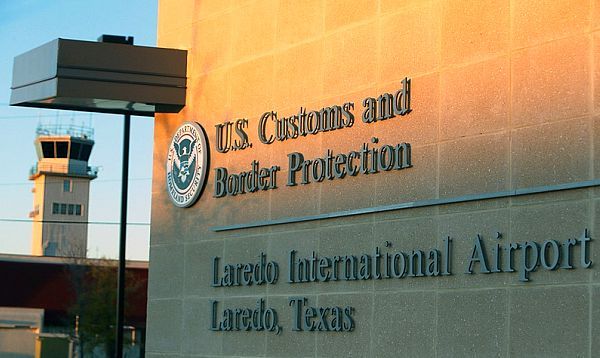Laredo, Texas — Call it one of the most heralded binational agreements between the United States and Mexico you have probably never heard of.
For more than a year, a Mexican customs inspection station has been open at the Laredo International Airport, the only airport in the US where Mexican agents preclear cargo headed south of the border.
Though officials in Laredo have praised the station as a signal of cooperation between the two countries the celebration since the initial opening at the airport has been muted, mostly because of delays in setting up a similar station across the border in Mexico. Mexican officials would like to have the same type of customs operation, but the issue of American agents carrying weapons is stalling progress.
The issue of American law enforcement officers carrying weapons in Mexico has long been a sensitive one between the two countries. It came to a fever pitch after the 2011 slaying of Jaime J. Zapata, a Brownsville native who worked in Mexico as a special agent with US Immigration and Customs Enforcement. Zapata was fatally wounded in a streetcar ambush on a Central Mexican highway. His colleague, Victor Avila, of El Paso, was wounded in the attack. They were unarmed, in compliance with Mexican law.
For Mexico, the question is one of sovereignty. Despite the years of bloodshed because of drug-related violence, Mexico is one of the countries in which it is most difficult to legally obtain a gun.
 |
| US Rep. Henry Cuellar, D-Laredo |
Mexican President Enrique Peña Nieto has been talking about being competitive economically, Cuellar said, adding that improving the flow of goods across the border could be a crucial part.
Some trade experts see the airport’s inspection station as a positive step that could alter cross-border trade.
"I think it was a smart decision to just go ahead with the one in Laredo," said Christopher Wilson, an associate at the Woodrow Wilson International Center for Scholars’ Mexico Institute who specializes in the North American Free Trade Agreement and the border economy. "It shows that progress can be made, that cooperative solutions can be found to some of these complicated sovereignty issues that arise as you start to deepen your level of security cooperation and border management."
Aside from the diplomatic gains, Wilson said, the initiative also made sense in terms of advancing the cross-border economic ties and furthering security initiatives.
"Where we strategically need to be going on the border is having single ports of entry," Wilson said. "In an ideal world, we don’t need to have two. We can have live intelligence sharing and not have to have monthly meetings with Mexican officials to share intelligence or strategies — we can make that happen on a minute-by-minute basis as they work right next to each other."
Some see the program’s potential success as containing unintended consequences.
Carlos R. Villarreal, the City Manager of Laredo, said there were reasons to hope for a breakthrough. When the issue of armed agents in Mexico arose during a recent meeting with trade officials in Washington, Villarreal said he was told Mexican officials were working to amend the law to pave the way for US customs agents to carry guns.
"That’s the only issue that’s pending," he said.
Officials at the Mexican Embassy in Washington DC did not return phone calls or emails seeking comment.
With the system in place at the Laredo airport, products are inspected there and then flown directly to their destinations in Mexico. Previously, cargo heading into Mexico had to be flown to an international airport in that country with inspection capabilities before heading to its final destination, Villarreal said.
 |
| Carlos R. Villarreal - City Manager of Laredo, Texas |
"This is changing how we do business with Mexico," he said, adding that some companies were interested in using the Laredo station because it allowed them to fly their cargo into Mexico rather than transport it by road.
Most of the merchandise being processed at the airport are electronics, he said, but with Mexico’s proposed energy reform, the airport could become a major shipping point for drilling and other extraction equipment.
That would only add to the region’s reputation as an international trade hub.
The South Texas city houses America’s busiest inland port. In January alone, the Laredo customs district saw about $20 billion in two-way trade with Mexico, according to WorldCity, a Florida-based company that uses census data to track trade patterns. That figure represented about half of the $41 billion that the United States saw in overall trading with its southern neighbor for the month.
James Giermanski, the chairman of Powers Global Holdings and president of Powers International, an international security company, said that preclearance at airports could hurt the freight forwarding and warehousing industries in Laredo, a major source of revenue for the economy. The companies store and inspect merchandise before it is given final approval to continue north or south.
"Some of the likely impact is you won’t need all the warehouses in Laredo," Giermanski said. Villarreal said that was a legitimate concern, but freight forwarding companies do not see any of the air cargo anyway.
"That business, right now, for the freight forwarders is flying 35,000 feet over their head," he said. And once the airport became a more popular option, he added, the warehouses would come into play more.
"They start using the airport, and then with the number of trucks we process here, it will give you other options to say, ‘Hey, let it stop here and fan out to get to other places like Houston or Austin or some other place and I’ll fly just the final shipment to Seattle or Chicago. The rest will go by trucks.’"
Original Story


